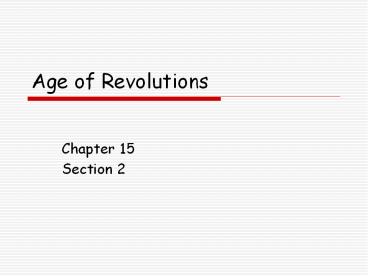Age of Revolutions - PowerPoint PPT Presentation
Title:
Age of Revolutions
Description:
Age of Revolutions Chapter 15 Section 2 Who is Marco Polo Marco Polo (1254-1324) was an Italian voyager and merchant who was one of the first Europeans to travel ... – PowerPoint PPT presentation
Number of Views:257
Avg rating:3.0/5.0
Title: Age of Revolutions
1
Age of Revolutions
- Chapter 15
- Section 2
2
Who is Marco Polo
- Marco Polo (1254-1324) was an Italian voyager and
merchant who was one of the first Europeans to
travel across Asia through China - visited the Kublai Khan in Beijing
- He left in 1271 (he was a teenager at the time)
with his father (Nicolo Polo) and uncle (Maffeo
Polo) - they spent about 24 years traveling.
3
The Age of Discovery
- During the Renaissance, traders began to travel
outside of Europe - Portuguese traveled to Africa for trade
- 1492 Christopher Columbus landed in the
Americas claimed land for Spain - France, England, and the Netherlands also began
to expand their overseas trade
4
The Age of Monarchs
- Monarchs became absolute monarchs had complete
power over their subjects - Age of Exploration made the monarchs very rich
- Middle Class formed paid taxes to the monarchs
eliminating the need for feudal lords - Monarchs made their countries strong and unified
but taxed citizens heavily - Europeans began to question the power of their
governments
5
Revolution
- Revolution a far-reaching change
- European thoughts, beliefs, and ways of life all
changed
6
Revolutions in Government
- Revolution in England
- King Charles I refused to share power with
Parliament - Parliament overthrew the King
- No English ruler could ever claim absolute power
again
7
Revolutions in Government
- French Revolution
- King Louis XIV declared, I am the state
- Taxed citizens heavily
- French citizen rebelled and overthrew King Louis
XIV
8
Revolution in Science
- Influenced by humanism and the Renaissance,
scientists began to observe nature carefully and
to record their observations - Based their theories on facts instead of
religious beliefs - Scientific method was used ideas were tested
with experiments and observations
9
Scientific Developments
- Copernicus suggested that the sun was the
center of the universe the earth moved around
the sun - Robert Boyle set the stage for modern chemistry
- William Harvey discovered how blood circulates
in the body - Antonie van Leeuwenhoek developed techniques
for making microscopes - Isaac Newton invented calculus































